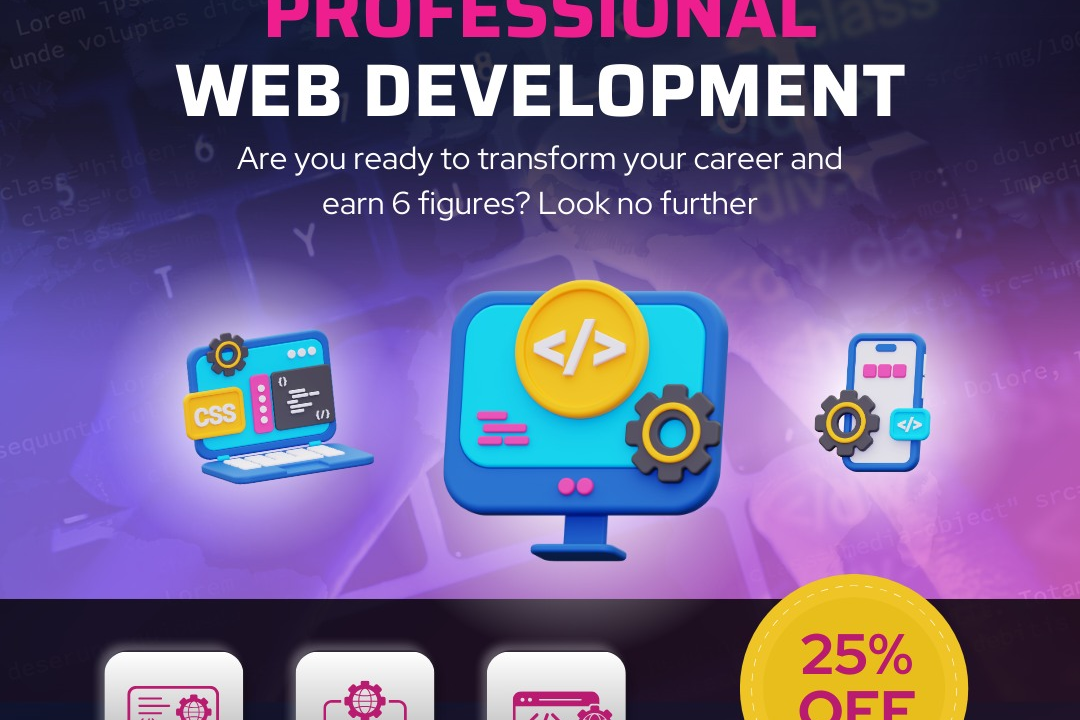Selenium Training In Kondapur
Selenium training in Kondapur is an intensive program designed for individuals seeking to excel in s
Selenium Training In Kondapur
Selenium training in Kondapur is a valuable opportunity for aspiring software testers and automation engineers to master one of the most popular tools in the industry. With the increasing demand for efficient and reliable web application testing, this training equips participants with the skills to automate testing processes, ensuring higher accuracy and faster deployment. By covering essential concepts such as writing test scripts, handling various web elements, and executing real-time projects, learners gain practical experience that is crucial for career advancement. This training not only enhances technical proficiency but also opens doors to numerous job opportunities in the thriving IT sector.
To Download Our Brochure: https://www.justacademy.co/download-brochure-for-free
Message us for more information: +91 9987184296
Selenium training in Kondapur is a valuable opportunity for aspiring software testers and automation engineers to master one of the most popular tools in the industry. With the increasing demand for efficient and reliable web application testing, this training equips participants with the skills to automate testing processes, ensuring higher accuracy and faster deployment. By covering essential concepts such as writing test scripts, handling various web elements, and executing real time projects, learners gain practical experience that is crucial for career advancement. This training not only enhances technical proficiency but also opens doors to numerous job opportunities in the thriving IT sector.
Course Overview
The Selenium Training in Kondapur is designed to equip participants with comprehensive skills in automated web application testing using the Selenium framework. This course covers fundamental concepts, including test automation architecture, writing test scripts in various programming languages such as Java and Python, handling dynamic web elements, and implementing test frameworks like TestNG and JUnit. With a strong emphasis on real-time projects, learners will gain hands-on experience in executing tests, debugging, and generating test reports, empowering them to address real-world testing challenges effectively. By the end of the training, participants will be well-prepared to pursue a successful career in software testing and automation.
Course Description
The Selenium Training in Kondapur is a comprehensive program aimed at individuals looking to master automated web application testing using the Selenium framework. This training covers essential topics such as test automation principles, writing and executing test scripts in popular programming languages like Java and Python, and managing various web elements. Participants will engage in hands-on projects that reflect real-world scenarios, allowing them to gain practical experience in test planning, execution, debugging, and reporting. By the end of the course, learners will have the skills and confidence needed to excel in software testing and automation roles, making them valuable assets in the tech industry.
Key Features
1 - Comprehensive Tool Coverage: Provides hands-on training with a range of industry-standard testing tools, including Selenium, JIRA, LoadRunner, and TestRail.
2) Practical Exercises: Features real-world exercises and case studies to apply tools in various testing scenarios.
3) Interactive Learning: Includes interactive sessions with industry experts for personalized feedback and guidance.
4) Detailed Tutorials: Offers extensive tutorials and documentation on tool functionalities and best practices.
5) Advanced Techniques: Covers both fundamental and advanced techniques for using testing tools effectively.
6) Data Visualization: Integrates tools for visualizing test metrics and results, enhancing data interpretation and decision-making.
7) Tool Integration: Teaches how to integrate testing tools into the software development lifecycle for streamlined workflows.
8) Project-Based Learning: Focuses on project-based learning to build practical skills and create a portfolio of completed tasks.
9) Career Support: Provides resources and support for applying learned skills to real-world job scenarios, including resume building and interview preparation.
10) Up-to-Date Content: Ensures that course materials reflect the latest industry standards and tool updates.
Benefits of taking our course
Functional Tools
1 - Selenium WebDriver: Selenium WebDriver is the core component of the Selenium suite and is vital for automating web applications for testing purposes. It provides a programming interface to create and execute test cases in various programming languages such as Java, C#, Python, and Ruby. The training program focuses on understanding how WebDriver interacts with web elements, enabling testers to simulate user actions, manipulate the DOM, and perform various operations unique to different web browsers. With its ability to handle dynamic web applications, WebDriver is crucial for creating robust automated test scripts.
2) TestNG: TestNG is a testing framework inspired by JUnit and NUnit but introduces additional features that enhance test configuration and execution. The course covers TestNG’s annotations and features, such as parallel test execution, data driven testing, and grouping of tests, which streamline the testing process. Participants also learn to utilize TestNG for generating comprehensive test reports, helping teams to understand test coverage and results effectively. This framework aids in achieving a structured approach to testing, which is essential for maintaining large scale applications.
3) Selenium Grid: Selenium Grid allows for the parallel execution of tests across multiple machines and browsers, significantly reducing the testing time for applications. In this training, students gain insights into setting up and configuring a Selenium Grid, enabling them to run tests simultaneously on different environments. This tool is particularly beneficial for teams working in Agile environments where continuous integration and rapid release cycles apply. Mastery of Selenium Grid ensures that participants can ensure cross browser compatibility swiftly and efficiently.
4) Maven: Apache Maven is a build automation tool used primarily for Java projects that manages project dependencies and builds life cycles. The training program introduces participants to Maven’s role in managing Selenium test scripts, making it easy to handle multiple dependencies and plugins. By utilizing Maven, students learn to configure the project, run tests conveniently, and integrate their testing efforts with popular CI/CD tools. This knowledge promotes better project organization and accelerates the deployment process.
5) Cucumber: Cucumber is a tool that supports Behavior Driven Development (BDD) and promotes collaboration between technical and non technical stakeholders. During the course, participants learn how to write tests in a human readable format, fostering better communication within teams. This feature of Cucumber encourages the adoption of best practices in test automation, allowing students to understand how to create scenarios that reflect user requirements. The course emphasizes integrating Cucumber with Selenium to automate functional tests, ensuring high user satisfaction in delivered products.
6) Apache POI: Apache POI is an API used for reading and writing data in Microsoft Office documents, including Excel spreadsheets. The training program incorporates Apache POI to help students manage and manipulate data, especially for data driven testing where large datasets are involved. Participants learn how to read test data from Excel, utilize the data within their Selenium tests, and write results back to spreadsheets for reporting purposes. Understanding how to use Apache POI effectively enhances the capability of students to create dynamic test cases that can adapt to various input scenarios.
7) Extent Reports: Extent Reports is a customizable reporting library for Selenium tests that provides detailed and interactive reports. In this course, participants explore how to integrate Extent Reports with Selenium WebDriver tests to document the test execution process comprehensively. By creating visually appealing reports with real time updates, students learn to provide stakeholders with insights into test performance and issues encountered, improving overall communication and transparency in the testing lifecycle. This tool is essential for teams looking to maintain high quality in their testing documentation.
8) Page Object Model (POM): The Page Object Model is a design pattern that enhances test maintenance and reduces code duplication in automated tests. The training delves into the concept of organizing code in a way that represents web pages as objects, encapsulating the elements and actions associated with each page. This modular approach not only improves the readability of the code but also simplifies updates when the web UI changes. Students learn to implement POM effectively, leading to a more maintainable and scalable test suite.
9) Continuous Integration/Continuous Deployment (CI/CD): Understanding CI/CD practices is essential for automating the testing and deployment pipelines in modern development environments. The course examines popular CI/CD tools like Jenkins, CircleCI, and Travis CI, demonstrating how to integrate Selenium tests into these pipelines. Participants learn to configure automated test runs upon code commits and deployments, ensuring quick feedback and maintaining high software quality throughout the development lifecycle. Mastering CI/CD helps teams to streamline their workflows and enhance productivity.
10) API Testing with RestAssured: API testing is critical in today’s interconnected applications. The training introduces RestAssured, a powerful Java library for testing RESTful APIs. Participants learn how to write automated tests for APIs effectively, validating responses, checking status codes, and ensuring correct data formats. Understanding API testing is vital for students as it complements their Selenium skills, enabling them to cover testing aspects beyond just the UI, thus ensuring comprehensive coverage of the application.
11 - Locators and Element Identification: A crucial part of Selenium is the ability to locate web elements accurately. This section of the training covers various locator strategies, such as ID, class name, XPath, CSS selector, and more. Students gain practical experience in identifying elements effectively under different circumstances, which is vital for creating stable and reliable test scripts. Being adept at using these locators ensures that tests interact with the correct elements, minimizing test failures due to changes in the web page structure.
12) Handling Web Alerts and Pop ups: Web alerts, modals, and pop ups can complicate test automation. The course educates participants on strategies for handling these interruptions while ensuring that they do not disrupt automated test flows. Students learn to interact with various types of alerts (JavaScript alerts, confirmation boxes) and how to manage pop up windows, enhancing their ability to create robust test scenarios that reflect real user interactions.
13) Cross Browser Testing: With a multitude of browsers available, ensuring consistent behavior across all platforms is paramount. The training provides insights into cross browser testing strategies, focusing on leveraging Selenium Grid and cloud based services like BrowserStack or Sauce Labs. Participants come to understand how to automate tests on various browsers, recognize browser specific issues, and ensure that web applications perform flawlessly across different environments.
14) Test Automation Strategy and Best Practices: Building an effective test automation strategy is essential for success. This point encompasses defining the scope of automation, selecting the right tools, and aligning automation efforts with business objectives. The course elaborates on best practices such as test case prioritization, maintaining a clean codebase, and implementing a robust version control system. Students learn the significance of adopting disciplined approaches to ensure successful test automation initiatives.
15) Error Handling and Logging: In test automation, managing exceptions and capturing logs are crucial for effective debugging and enhancing test reliability. The training includes best practices for implementing error handling, writing meaningful log messages, and utilizing logging frameworks. Participants learn how to troubleshoot issues efficiently, ensuring that tests yield accurate results and simplify the debugging process when tests fail.
16) Mocking and Stubbing: In many testing scenarios, relying on actual services may not be feasible. This course element covers the concepts of mocking and stubbing to simulate external dependencies and isolate tests. Participants learn how to use libraries such as Mockito to create mock objects, allowing them to focus on testing individual components of their application. This skill is particularly valuable when testing applications integrated with third party services or databases, making the testing process more efficient.
17) Performance Testing with Selenium: Although Selenium is primarily used for functional testing, understanding performance testing is essential. The training introduces basic principles of performance testing and how to integrate it with Selenium scripts. Participants learn to measure load times and assess the responsiveness of web applications under various conditions. While Selenium may not be the primary tool for performance testing, this knowledge enables participants to recognize performance bottlenecks during automated testing phases.
These additional points enhance the curriculum, providing a comprehensive approach to mastering test automation with Selenium and related technologies. With practical projects and hands on experience, students will be well equipped to tackle real world challenges in test automation.
Browse our course links : https://www.justacademy.co/all-courses
To Join our FREE DEMO Session:
This information is sourced from JustAcademy
Contact Info:
Roshan Chaturvedi
Message us on Whatsapp: +91 9987184296
Email id: info@justacademy.co
Org OpenQA Selenium Remote ProtocolHandshake CreateSession Appium












